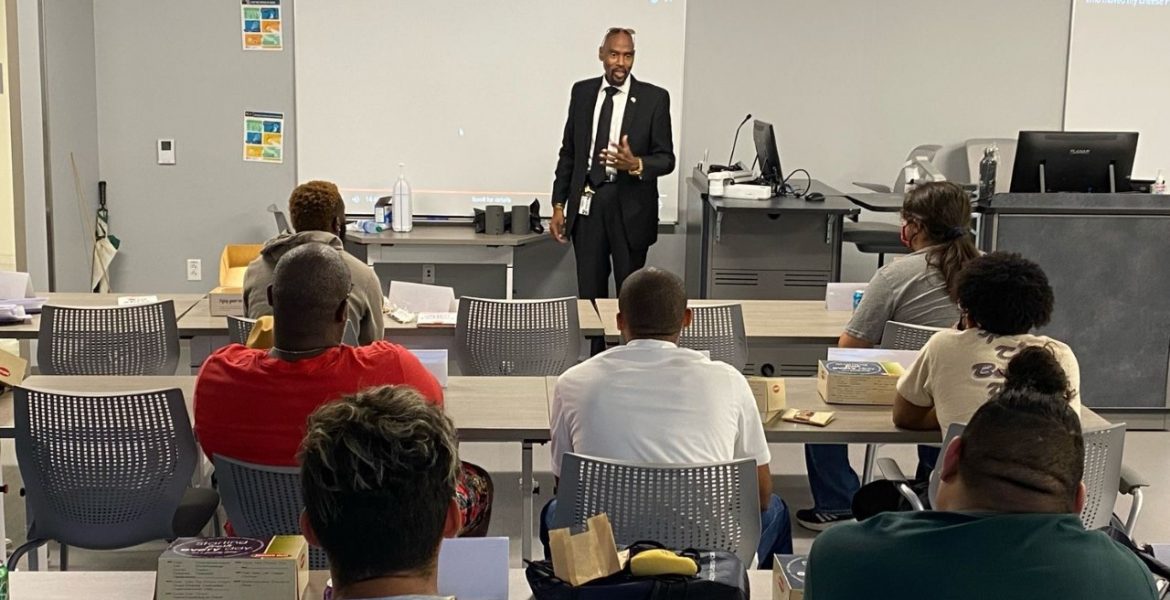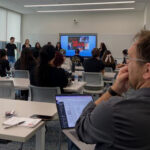A program to help minority male students succeed at Texas A&M University-San Antonio is making a difference since it started in the fall, according to its founder and a student who says it makes him feel less alone.
The Achievement Initiative for Minority Males, or AIMM, at A&M-San Antonio is one of many similar programs throughout the country.
Jarrick Brown, assistant director of student involvement, is AIMM’s founder.
The program has 21 students, each paired with a faculty or staff mentor this academic year. AIMM started on Sept. 23 and will continue till the end of April.
“I submitted a proposal to have it done and it transferred over to many higher-ups on campus — the director of student enrollment, our vice president and others,” Brown said. “After the proposal got reviewed, then I got the OK to make it happen.”
Brown said the university launched the program because mentors “have a desire to help students who are willing to reach out.” Mentors feel some students want to excel but are limited due to a lack of guidance.
The Texas Education Consortium for Male Students of Color included the following data in a 2016 report: Among college students who were at least 25 years old, under 15% of Hispanic males and only 21% of black males gained a bachelor’s degree or higher, according to 2015 numbers from the National Center for Education Statistics.
Brown explained the process of creating the program, making a task force and getting the right people to help facilitate how “the minority male should look on our campus.”
He found inspiration for making the AIMM program here because of the tragedy of George Floyd and his death. He said he thought “these minority students need a safe place where they can succeed and not have to worry and create fellowship with other minority males that have been in the same or similar situation as them.”
Joseph Pickering, director of Student Involvement and a mentor to AIMM students, said he was one of the first to sign up as a mentor.
“Jarrick reached out to me and told me how he wanted to make a difference on campus and help those who need it,” Pickering said.
Business junior Justin Floyd, a student in the program, said he hopes “that there are more programs like this one. Personally, its checks-ins help me a lot, and that feeling of not being alone is great. I know that the others in the group probably agree with me. I would really hope that there are more programs like this.”
Floyd said he saw a flyer on campus about the AIMM program and decided to contact for more information.
“At the time the George Floyd situation and the pandemic were very impactful in my life and when I heard about AIMM, I thought it was something that could help me out,” Floyd said.
Brown said programs such as AIMM can be beneficial for any university.
“Having the minority male initiative is great for any institution to have,” Brown said. “It helps them as well as any university that partakes in such things.”
Similar programs exist at institutions including Texas State University, Prairie View A&M University, the University of Texas at San Antonio, Lone Star College-CyFair, Houston Community College, Texas Southern University, the University of Houston-Downtown, Broward College in Fort Lauderdale, Florida, and the University System of Georgia.
Meanwhile, there are local and national organizations dedicated to boosting success of minority males at colleges and universities.
My Brother’s Keeper San Antonio is one of the UP Partnership’s networks.
These programs want to help these students and become the equalizer for their graduation and retention rates throughout all ethnicities. The UP Partnership’s College Success Dashboard found that students of color at Bexar County public schools are not equally prepared for higher education. According to UP, the percentages of high school graduates who are college ready are:
American Indian: 56%
Asian: 76%
Black/African American: 36%
Hispanic/Latinx: 44%
Pacific Islander: 38%
Two or more: 58%
White: 63%
Other such initiatives include 100 Black Men of America and the Texas Education Consortium for Male Students of Color.
Research has shown that programs like this help with graduation and retention rates for students.
A survey done in September 2021 by Insider Higher Ed and College Pulse showed a relationship between having a mentor and feeling ready for the world after college.
Almost 75 percent of students who felt extremely prepared to join the workforce or advance their education have had a mentor, compared with about 25 percent who felt extremely unprepared. About 66 percent of respondents who were extremely certain about what they wanted to do after graduation had a mentor, while only 38 percent of those who were extremely uncertain about their future did.
At A&M-San Antonio, Brown said he hopes to continue attracting mentors and speakers who have found success to help motivate students in the right direction.
“The goal of the program is to create a safe community for our minority males on campus,” he said. “Therefore, I am looking for facilitators to present to our participants at our monthly workshops.”
For more information about joining AIMM in fall 2022, contact Brown at jbrown@tamusa.edu or visit the Office of Student Activities in Suite 103 of the Central Academic Building.







